cancer support
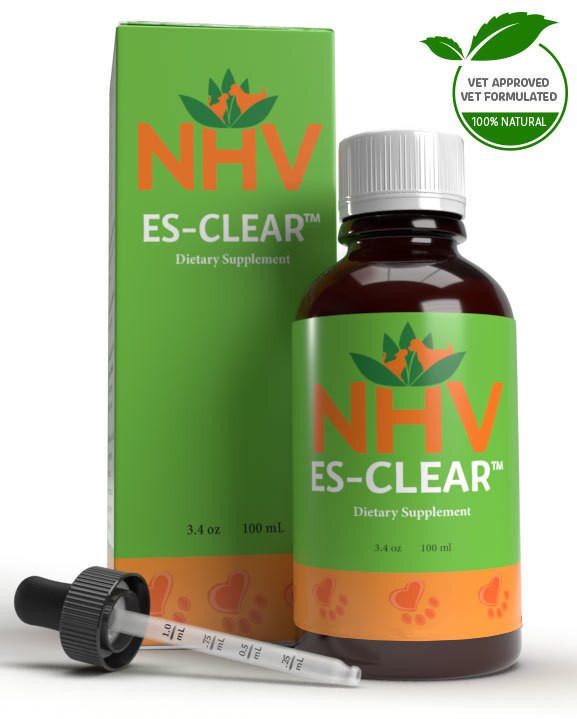
free shipping over $100 (USA & Canada)
1-877-937-4372 the pet expert hotline
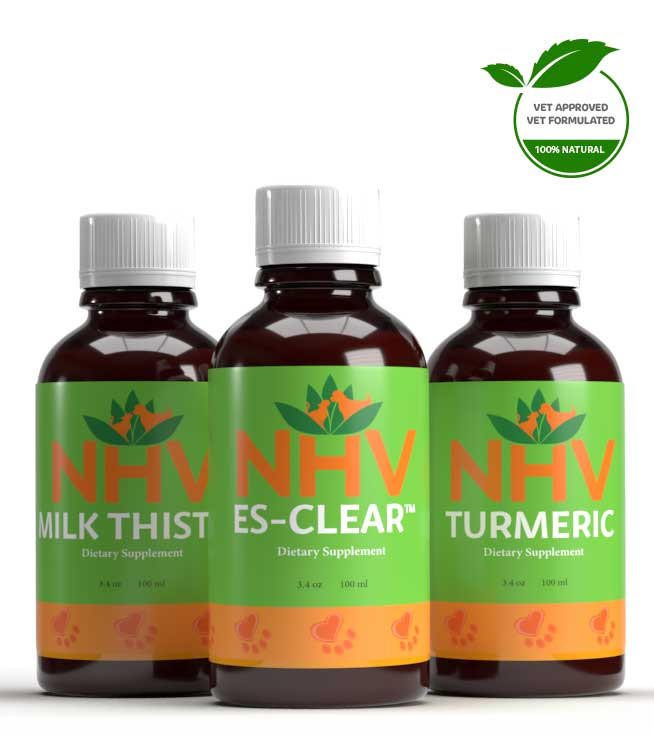
ES-Clear, Milk Thistle & Turmeric

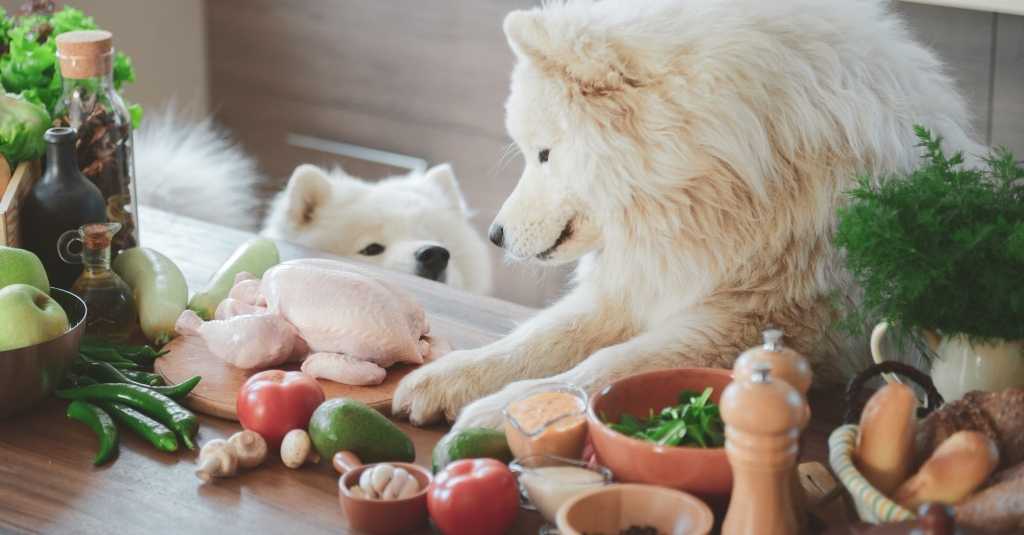
Just like humans, dogs, and cats suffering from cancer or going through cancer treatment may suffer from a severe lack of appetite, which only contributes to further deterioration in their health and well-being. In fact, adequate nutrition is particularly important for any pet being treated with chemotherapy drugs since a lack of nutrition predisposes our pets to the toxicity of the drugs and results in a poor therapeutic response. That’s why it’s so important to talk about pet cancer diets and nutrition.
Proper diet and supplementation are absolutely essential for a good quality of life.
Proper diet and supplementation are absolutely essential if your pet is to have a fighting chance of overcoming this dreaded disease and having a good quality of life. Researchers are still studying what nutritional requirements for pets with cancer need. However, there are some studies that have shown that a diet with increased protein and fat, decreased carbohydrates, and the addition of supplements and omega-3s may be beneficial for dogs and cats with cancer. The diet for dogs should be 35-40% protein; 30% fat; and 20% carbohydrates. Cats should have more protein, less fat, and minimal to no carbohydrates. Let’s explore some of the reasons why this type of diet may be beneficial for pets with cancer.
A diet high in protein is thought to beneficial due to the decrease of certain amino acids such as arginine found in the plasma of cancer patients. Arginine can be found in animal sources like beef, poultry, and seafood. You may also find arginine supplements through your local holistic veterinarian.
The reason pet parents want to feed their pets a diet high in fat is due to the way tumor cells, unlike healthy cells use fat. Basically, tumor cells have difficulty utilizing lipids for energy. A diet high in fat will also help with cachexia (or wasting) experienced by cats and dogs with cancer.
A diet low in carbohydrates is thought to be helpful since pets with cancer have increased lactic acid in their blood. Since the metabolism of simple carbohydrates produces lactate, its thought that a diet low in carbohydrates may be beneficial.
The addition of omega 3’s may prove useful for cancer patients as it may help promote weight gain, and may have anticancer effects. For an omega supplement try NHV PetOmega 3.
Additional vitamins and supplements will help boost the immune system and help fight tumors and increase energy and well-being. NHV recommends Pet Cancer Super Support Kit, which contains NHV ES Clear for cancer support, NHV Milk Thistle for liver support, and Turmeric, which helps to scavenge free radicals and is also a superfood.
Feel free to contact your NHV Pet Experts. We have a vast array of holistic recipes in our library, which we can choose from to help you and your pet.
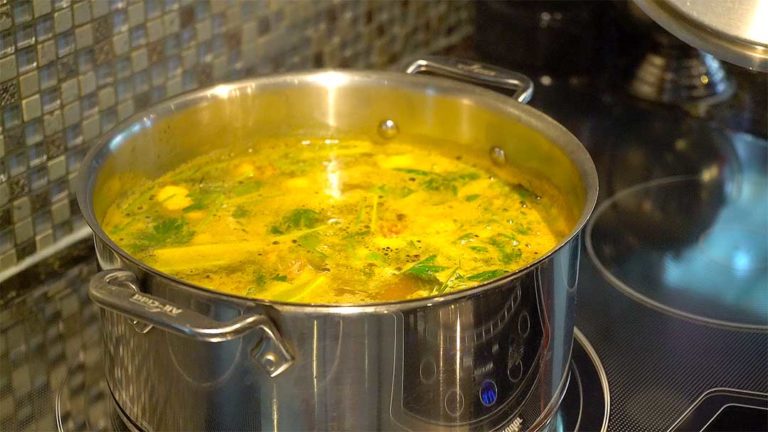
Feeding a sick pet can be tricky. Once our cats and dogs lose their appetite it can be difficult to convince them to eat. At NHV we really like using bone broth as a topper to be put on top of the pet cancer recipe or dry food for dogs. Bone broth has a mouth-watering smell that will help stimulate your dog’s appetite and get them to want to eat. It’s also rich in nutrients and is made for pets without toxic ingredients like onions so you know you’re feeding them something healthy as well as tasty. You can find recipe ideas for making your own bone broth at home here.
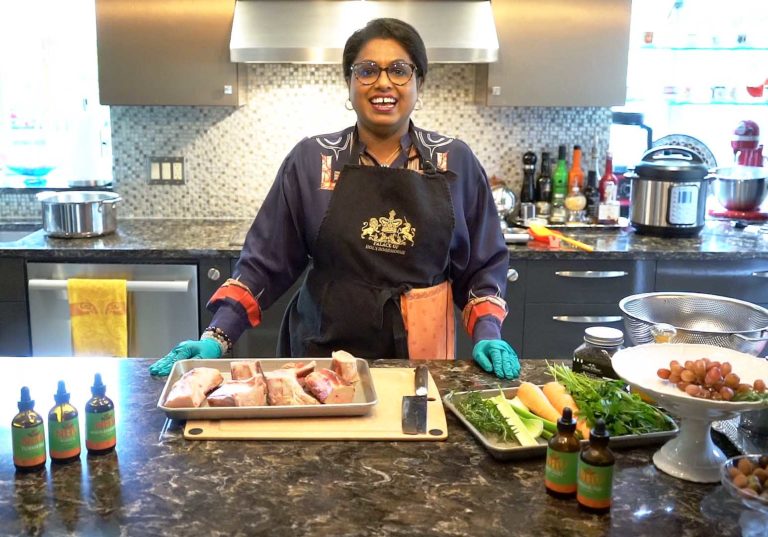
Another tip to getting your furry companion to eat is to simply sit with them. Sit down in their eating area, coax them over gently, give them a pat and a kind word. Your simple gesture of love will do wonders to get your pet to at least begin to eat.
Once again if you need a recipe or any advice please do contact your NHV Pet Experts, we are here to give you the support you and your fur baby need.
cancer support

A Vet-Approved Natural Canine Cancer Support Supplement
buy 2 and save $3
3 month supply for a small to medium size pet.
All-natural ES-Clear helps manage the symptoms of cancer in dogs. This vet-formulated supplement will support your dog's overall immunity, health, and well-being.

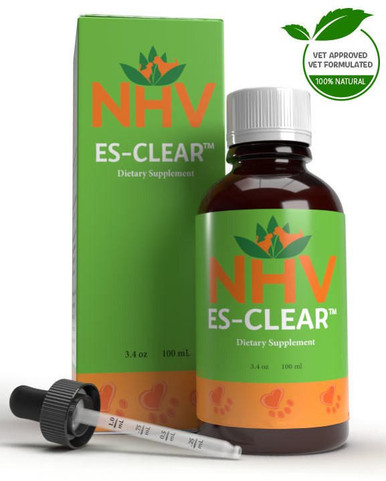
All-natural ES-Clear helps manage the symptoms of cancer in dogs. This vet-formulated supplement will support your dog's overall immunity, health, and well-being.

Use ES-Clear in conjunction with traditional or holistic dog cancer treatments, including nutritional therapy to help improve your pup’s quality of life. With the right nutrition, supplementation, holistic cancer therapy, and vet prescribed treatment, your dog can live for many years with a cancer diagnosis.
It is heartbreaking to learn that your dog has cancer. ES-Clear was created to help pet parents naturally support their dogs’ cancer treatment plan prescribed by their veterinarian. It was designed to balance your dog’s immune system, ease the discomfort associated with cancer in dogs, and help improve appetite and energy levels.
Living with cancer can be draining on your dog’s body. With a specially formulated blend of herbs, ES-Clear helps balance immune function and reverse the buildup of toxins.
Natural herbs work synergistically to support the body while helping to minimize the side effects of cancer treatment. You can read Ranger's story of his battle with cancer, and find out how he’s doing today.
NHV’s ES-Clear can be safely used with conventional treatment for cancer in dogs as a natural supporting supplement. Talk to your vet about using it as part of holistic treatment for your dog’s cancer
To learn more about the benefits of integrative medicine, ask an NHV expert today. At NHV, we want your fur baby to be fur-ever healthy and happy naturally.
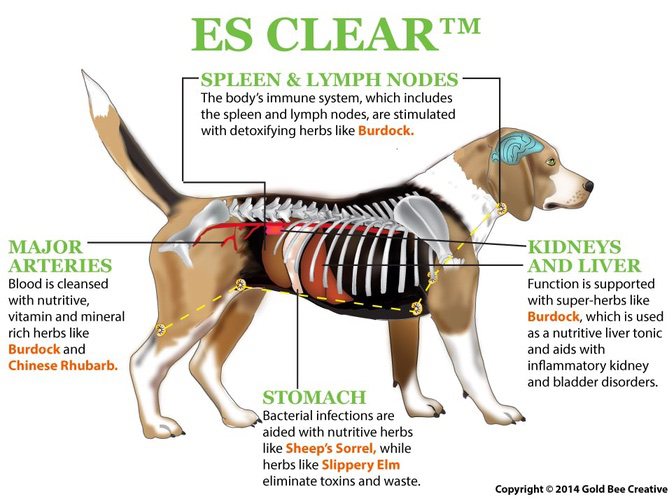
Burdock - This potent herb is full of nutrients including natural minerals such as calcium, iron, riboflavin, phosphorous and thiamine. It also supports the liver and helps cleanse free radicals from the blood to improve blood quality.
Sheep’s Sorrel - An excellent source of vitamins such as A, B complex and C, D, E and K and minerals and has been used to holistically treat cancer in dogs, along with other degenerative diseases. Helps balance the dog’s immune system. Contains beta-carotene which is high in antioxidants.
Slippery Elm - Contains anti-inflammatory properties and assists in soothing the stomach lining, which can become inflamed as a side effect when taking some conventional medicines.
Chinese Rhubarb - A multi-functional herb with astringent properties that help the appetite, which dogs can also suffer from during conventional treatment of canine cancer. This powerful herb eliminates toxins by cleansing the intestines, and helps to detoxify the liver by improving bile flow.
Select your pet's weight to determine the correct dose.
To be taken twice daily. Determine your pet’s weight and then use the easy chart below to determine the correct dose. This is the minimum dosage.
Pet's Weight Dosage
0 - 15 lb = 0.5 ml
16 - 30 lb = 1.0 ml
31 - 45 lb = 1.5 ml
46 - 60 lb = 2.0 ml
61 - 75 lb = 2.5 ml
Over 75 lb = 3.0 ml
How to Administer
Shake well before use. The easiest method is to use the dropper provided and place the drops into your pet’s food or favorite treat. You can also use the dropper and squirt directly into the pet’s mouth. Some pets can be finicky, if this occurs consider hiding the drops in foods most pet’s love such as fish, chicken, yogurt, or a favorite treat. If your pet only eats dry food then soak a few kibbles at feeding time.
For Best Results
Herbal dietary supplements are beneficial to the health and well-being of your pet and are safe for long-term use. Every pet responds to natural herbal supplements differently, therefore it is important to be consistent and administer the product daily. Supplements generally take two to four weeks to take effect, however this will vary from one animal to the next.
Product Storage
All NHV Natural Pet Products are pure herbal extracts and contain no artificial additives, preservatives or coloring. Shelf life after opening is 6 months and must be refrigerated after opening.
Cautions and Contraindications
Do not use ES Clear in pregnant or nursing animals. Speak to your vet before using our products. A second visit is recommended if your pet’s condition does not improve, or deteriorates after continued use of the supplements.
All information provided by NHV Natural Pet Products is for educational purposes only.
Use ES-Clear in conjunction with traditional or holistic dog cancer treatments, including nutritional therapy to help improve your pup’s quality of life. With the right nutrition, supplementation, holistic cancer therapy, and vet prescribed treatment, your dog can live for many years with a cancer diagnosis.
It is heartbreaking to learn that your dog has cancer. ES-Clear was created to help pet parents naturally support their dogs’ cancer treatment plan prescribed by their veterinarian. It was designed to balance your dog’s immune system, ease the discomfort associated with cancer in dogs, and help improve appetite and energy levels.
Living with cancer can be draining on your dog’s body. With a specially formulated blend of herbs, ES-Clear helps balance immune function and reverse the buildup of toxins.
Natural herbs work synergistically to support the body while helping to minimize the side effects of cancer treatment. You can read Ranger's story of his battle with cancer, and find out how he’s doing today.
NHV’s ES-Clear can be safely used with conventional treatment for cancer in dogs as a natural supporting supplement. Talk to your vet about using it as part of holistic treatment for your dog’s cancer
To learn more about the benefits of integrative medicine, ask an NHV expert today. At NHV, we want your fur baby to be fur-ever healthy and happy naturally.

Burdock - This potent herb is full of nutrients including natural minerals such as calcium, iron, riboflavin, phosphorous and thiamine. It also supports the liver and helps cleanse free radicals from the blood to improve blood quality.
Sheep’s Sorrel - An excellent source of vitamins such as A, B complex and C, D, E and K and minerals and has been used to holistically treat cancer in dogs, along with other degenerative diseases. Helps balance the dog’s immune system. Contains beta-carotene which is high in antioxidants.
Slippery Elm - Contains anti-inflammatory properties and assists in soothing the stomach lining, which can become inflamed as a side effect when taking some conventional medicines.
Chinese Rhubarb - A multi-functional herb with astringent properties that help the appetite, which dogs can also suffer from during conventional treatment of canine cancer. This powerful herb eliminates toxins by cleansing the intestines, and helps to detoxify the liver by improving bile flow.
Select your pet's weight to determine the correct dose.
To be taken twice daily. Determine your pet’s weight and then use the easy chart below to determine the correct dose. This is the minimum dosage.
Pet's Weight Dosage
0 - 15 lb = 0.5 ml
16 - 30 lb = 1.0 ml
31 - 45 lb = 1.5 ml
46 - 60 lb = 2.0 ml
61 - 75 lb = 2.5 ml
Over 75 lb = 3.0 ml
How to Administer
Shake well before use. The easiest method is to use the dropper provided and place the drops into your pet’s food or favorite treat. You can also use the dropper and squirt directly into the pet’s mouth. Some pets can be finicky, if this occurs consider hiding the drops in foods most pet’s love such as fish, chicken, yogurt, or a favorite treat. If your pet only eats dry food then soak a few kibbles at feeding time.
For Best Results
Herbal dietary supplements are beneficial to the health and well-being of your pet and are safe for long-term use. Every pet responds to natural herbal supplements differently, therefore it is important to be consistent and administer the product daily. Supplements generally take two to four weeks to take effect, however this will vary from one animal to the next.
Product Storage
All NHV Natural Pet Products are pure herbal extracts and contain no artificial additives, preservatives or coloring. Shelf life after opening is 6 months and must be refrigerated after opening.
Cautions and Contraindications
Do not use ES Clear in pregnant or nursing animals. Speak to your vet before using our products. A second visit is recommended if your pet’s condition does not improve, or deteriorates after continued use of the supplements.
All information provided by NHV Natural Pet Products is for educational purposes only.
liver support
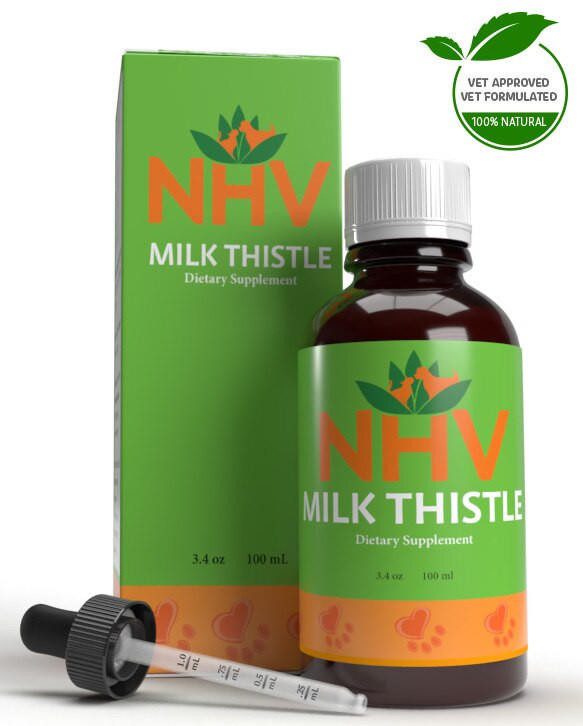
100% Natural Liver and Kidney Detox and Cancer Support in Cats
buy 2 and save $3
3 month supply for a small to medium size pet
A popular herb among conventional and holistic veterinarians, Milk Thistle is often recommended for cats who have liver disorders, are fighting cancer, diabetes, kidney issues, gallbladder and bile duct issues, as well as hyperthyroidism.

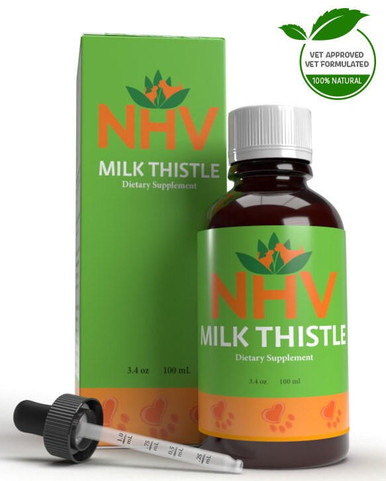
A popular herb among conventional and holistic veterinarians, Milk Thistle is often recommended for cats who have liver disorders, are fighting cancer, diabetes, kidney issues, gallbladder and bile duct issues, as well as hyperthyroidism.

Milk thistle, also known as Silybum Marianum is an herb that has been used for thousands of years by humans for its powerful medicinal properties. The active ingredient is Silymarin which contains flavonoids that have many beneficial properties including:
Milk thistle is one of the few herbs that have no equivalent in conventional medicine and has many uses. You can read about the many applications of Milk Thistle for cats and dogs on Dr. Hillary Cook's blog.
Milk Thistle for Liver Function
Milk Thistle for cats with liver disease is glycerin-based and safe for long-term use. This potent herbal formula provides excellent proactive support and can be taken in conjunction with conventional treatment.
Milk Thistle for Kidney Function
Milk Thistle for Anti-Cancer Support
Milk Thistle may also be beneficial to cats undergoing chemotherapy as Silymarium may enhance the activity of certain chemo drugs.
You can read Peachez's Story with Milk Thistle for cats and how it helped her with cancer and liver problems.
NHV’s certified organic Milk Thistle is a safe herb that is recommended and used by holistic practitioners. All of our products are all-natural and formulated by veterinarians with a focus on comprehensively supporting the health and well-being of your feline family member.
If you have questions about Milk Thistle or any of our plant-based products, ask an NHV expert because at NHV we want your kitty’s health to be purrfect!
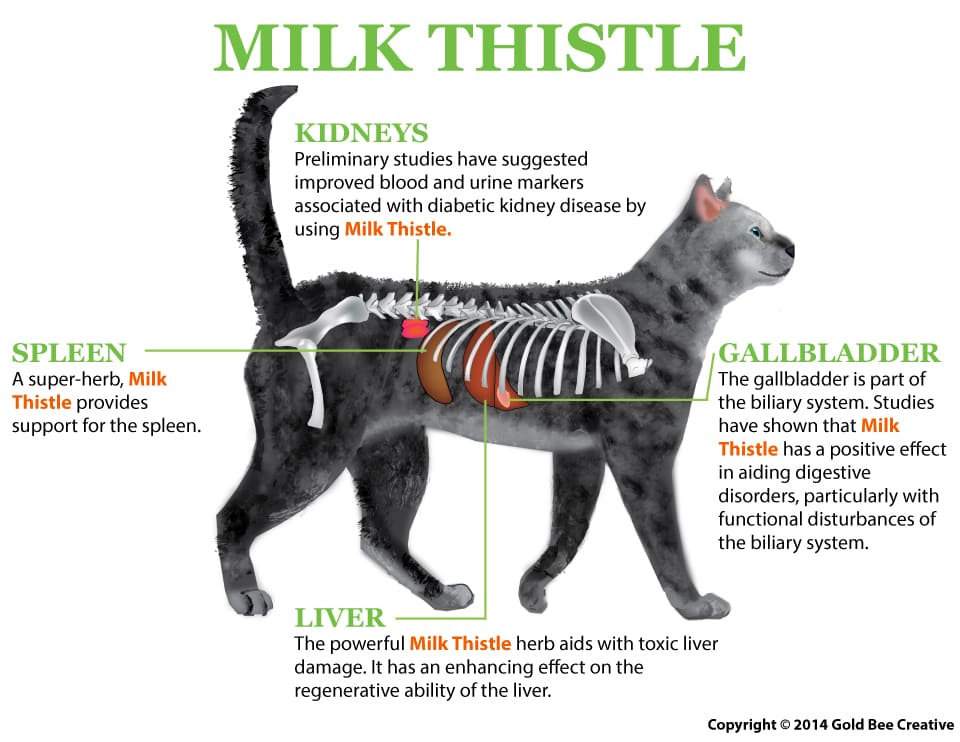
NHV’s Milk Thistle for Cats contains just one ingredient.
Select your pet's weight to determine the correct dose.
To be taken twice daily. Determine your pet’s weight and then use the easy chart below to determine the correct dose. This is the minimum dosage.
Pet's Weight Dosage
0 - 15 lb = 0.5 ml
16 - 30 lb = 1.0 ml
31 - 45 lb = 1.5 ml
46 - 60 lb = 2.0 ml
61 - 75 lb = 2.5 ml
Over 75 lb = 3.0 ml
How to Administer
Shake well before use. The easiest method is to use the dropper provide and places the drops into your pet’s food or favorite treat. You can also use the dropper and squirt directly into the pet’s mouth.
Some pets can be finicky, if this occurs consider hiding the drops in foods most pet’s love such as fish, chicken or yogurt or a favorite treat. If your pet only eats dry food then soak a few kibbles at feeding time.
For Best Results
Herbal dietary supplements are beneficial to the health and wellbeing of your pet and are safe for long-term use. Every pet responds to natural herbal supplements differently, therefore it is important to be consistent and administer the product daily. Supplements generally take two to four weeks to take effect, however this will vary from one animal to the next.
Product Storage
All NHV Natural Pet Products are pure herbal extracts and contain no artificial additives, preservatives or coloring. Shelf life after opening is 6 months and must be refrigerated after opening.
Cautions and Contraindications
Do not use Milk Thistle in pregnant or nursing animals. Speak to your vet before using our products. A second visit is recommended if your pet’s condition does not improve, or deteriorates after continued use of the supplements.
All information provided by NHV Natural Pet Products is for educational purposes only.
Milk thistle, also known as Silybum Marianum is an herb that has been used for thousands of years by humans for its powerful medicinal properties. The active ingredient is Silymarin which contains flavonoids that have many beneficial properties including:
Milk thistle is one of the few herbs that have no equivalent in conventional medicine and has many uses. You can read about the many applications of Milk Thistle for cats and dogs on Dr. Hillary Cook's blog.
Milk Thistle for Liver Function
Milk Thistle for cats with liver disease is glycerin-based and safe for long-term use. This potent herbal formula provides excellent proactive support and can be taken in conjunction with conventional treatment.
Milk Thistle for Kidney Function
Milk Thistle for Anti-Cancer Support
Milk Thistle may also be beneficial to cats undergoing chemotherapy as Silymarium may enhance the activity of certain chemo drugs.
You can read Peachez's Story with Milk Thistle for cats and how it helped her with cancer and liver problems.
NHV’s certified organic Milk Thistle is a safe herb that is recommended and used by holistic practitioners. All of our products are all-natural and formulated by veterinarians with a focus on comprehensively supporting the health and well-being of your feline family member.
If you have questions about Milk Thistle or any of our plant-based products, ask an NHV expert because at NHV we want your kitty’s health to be purrfect!

NHV’s Milk Thistle for Cats contains just one ingredient.
Select your pet's weight to determine the correct dose.
To be taken twice daily. Determine your pet’s weight and then use the easy chart below to determine the correct dose. This is the minimum dosage.
Pet's Weight Dosage
0 - 15 lb = 0.5 ml
16 - 30 lb = 1.0 ml
31 - 45 lb = 1.5 ml
46 - 60 lb = 2.0 ml
61 - 75 lb = 2.5 ml
Over 75 lb = 3.0 ml
How to Administer
Shake well before use. The easiest method is to use the dropper provide and places the drops into your pet’s food or favorite treat. You can also use the dropper and squirt directly into the pet’s mouth.
Some pets can be finicky, if this occurs consider hiding the drops in foods most pet’s love such as fish, chicken or yogurt or a favorite treat. If your pet only eats dry food then soak a few kibbles at feeding time.
For Best Results
Herbal dietary supplements are beneficial to the health and wellbeing of your pet and are safe for long-term use. Every pet responds to natural herbal supplements differently, therefore it is important to be consistent and administer the product daily. Supplements generally take two to four weeks to take effect, however this will vary from one animal to the next.
Product Storage
All NHV Natural Pet Products are pure herbal extracts and contain no artificial additives, preservatives or coloring. Shelf life after opening is 6 months and must be refrigerated after opening.
Cautions and Contraindications
Do not use Milk Thistle in pregnant or nursing animals. Speak to your vet before using our products. A second visit is recommended if your pet’s condition does not improve, or deteriorates after continued use of the supplements.
All information provided by NHV Natural Pet Products is for educational purposes only.
arthritis support
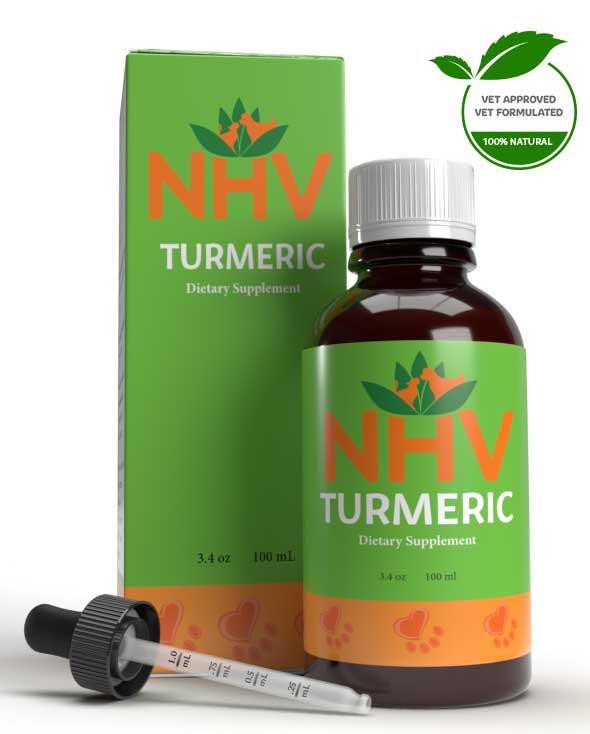
Supports your cat’s well-being
buy 2 and save $3
3 month supply for a small to medium size
Turmeric extract is a super herb that has anti-inflammatory and nutritive properties. It is a great supplement for all pets.
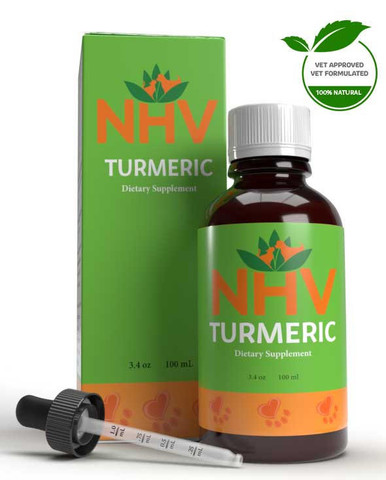
Turmeric extract is a super herb that has anti-inflammatory and nutritive properties. It is a great supplement for all pets.
Turmeric has become a household staple for many people, but this superfood has tremendous health benefits. Turmeric for cats helps support cats that may be fighting cancer, and also provides, arthritis support and also helps with digestion, skin issues, and is great for cardiovascular health.
Free radicals are unstable molecules that cause oxidative damage to cellular components such as proteins, lipids, and DNA. The free radical scavenging properties of turmeric supports the body in processing and removing these molecules, minimizing the damage they can do.
At NHV, we only use human-grade quality products as plant-based remedies. They are vet-approved and are safe to be given long-term along with any vet-prescribed medications.
Turmeric absorbs best when taken with black pepper, which increases enzyme secretions in the pancreas to aid in digestion. In NHV’s turmeric for cats supplement, it comes complete with the proprietary blend of both vital ingredients.
Read our blog to learn more about the health benefits of turmeric for cats with cancer. You can also read about Cuddles the picky kitty and how taking NHV’s complete kit containing turmeric for cats with arthritis helped her pounce back to health.
The active compound in turmeric is curcumin. Studies have shown turmeric to be an excellent anti-inflammatory, antioxidant, anti-fungal, antibacterial, anticoagulant, antiseptic, astringent, helps with liver function, bile production and externally for wound healing.
Turmeric for cats is beneficial for arthritic conditions due to the anti-inflammatory properties and is COX2 inhibitors.
You can use turmeric for your cat as a cancer support due to its antioxidant properties.
Use of turmeric extracts in a pets daily diet may help scavenge free radicals, increase antioxidant enzymes, and inhibit lipid peroxidation.
The healing properties of curcumin may also be beneficial for cats with autoimmune diseases, liver disorders ( increases detoxification of the liver) and heart and circulatory support. Turmeric for cats may help lower the bad cholesterol (LDL), and also helps reduce the risk of blood clotting.
Black pepper is well known for cooking, but it comes with a host of beneficial medicinal properties for your cat. Black pepper itself also has anti-inflammatory, antioxidant, and anti-bacterial. It helps to promote digestion, and studies show that it helps protect against oxidative damage by inhibiting free radicals.
Select your pet's weight to determine the correct dose.
To be taken twice daily. Determine your pet’s weight and then use the easy chart below to determine the correct dose. This is the minimum dosage.
Pet's Weight Dosage
0 - 15 lb = 0.5 ml
16 - 30 lb = 1.0 ml
31 - 45 lb = 1.5 ml
46 - 60 lb = 2.0 ml
61 - 75 lb = 2.5 ml
Over 75 lb = 3.0 ml
How to Administer
Shake well before use. The easiest method is to use the dropper provide and places the drops into your pet’s food or favorite treat. You can also use the dropper and squirt directly into the pet’s mouth.
Some pets can be finicky, if this occurs consider hiding the drops in foods most pet’s love such as fish, chicken or yogurt or a favourite treat. If your pet only eats dry food then soak a few kibbles at feeding time.
For Best Results
Herbal dietary supplements are beneficial to the health and wellbeing of your pet and are safe for long-term use. Every pet responds to natural herbal supplements differently, therefore it is important to be consistent and administer the product daily. Supplements generally take two to four weeks to take effect, however this will vary from one animal to the next.
Product Storage
All NHV Natural Pet Products are pure herbal extracts and contain no artificial additives, preservatives or coloring. Shelf life after opening is 6 months and must be refrigerated after opening.
Cautions and Contraindications: Do not use Turmeric in pregnant or nursing animals. Speak to your vet before using our products. A second visit is recommended if your pet’s condition does not improve, or deteriorates after continued use of the supplements.
Turmeric has become a household staple for many people, but this superfood has tremendous health benefits. Turmeric for cats helps support cats that may be fighting cancer, and also provides, arthritis support and also helps with digestion, skin issues, and is great for cardiovascular health.
Free radicals are unstable molecules that cause oxidative damage to cellular components such as proteins, lipids, and DNA. The free radical scavenging properties of turmeric supports the body in processing and removing these molecules, minimizing the damage they can do.
At NHV, we only use human-grade quality products as plant-based remedies. They are vet-approved and are safe to be given long-term along with any vet-prescribed medications.
Turmeric absorbs best when taken with black pepper, which increases enzyme secretions in the pancreas to aid in digestion. In NHV’s turmeric for cats supplement, it comes complete with the proprietary blend of both vital ingredients.
Read our blog to learn more about the health benefits of turmeric for cats with cancer. You can also read about Cuddles the picky kitty and how taking NHV’s complete kit containing turmeric for cats with arthritis helped her pounce back to health.
The active compound in turmeric is curcumin. Studies have shown turmeric to be an excellent anti-inflammatory, antioxidant, anti-fungal, antibacterial, anticoagulant, antiseptic, astringent, helps with liver function, bile production and externally for wound healing.
Turmeric for cats is beneficial for arthritic conditions due to the anti-inflammatory properties and is COX2 inhibitors.
You can use turmeric for your cat as a cancer support due to its antioxidant properties.
Use of turmeric extracts in a pets daily diet may help scavenge free radicals, increase antioxidant enzymes, and inhibit lipid peroxidation.
The healing properties of curcumin may also be beneficial for cats with autoimmune diseases, liver disorders ( increases detoxification of the liver) and heart and circulatory support. Turmeric for cats may help lower the bad cholesterol (LDL), and also helps reduce the risk of blood clotting.
Black pepper is well known for cooking, but it comes with a host of beneficial medicinal properties for your cat. Black pepper itself also has anti-inflammatory, antioxidant, and anti-bacterial. It helps to promote digestion, and studies show that it helps protect against oxidative damage by inhibiting free radicals.
Select your pet's weight to determine the correct dose.
To be taken twice daily. Determine your pet’s weight and then use the easy chart below to determine the correct dose. This is the minimum dosage.
Pet's Weight Dosage
0 - 15 lb = 0.5 ml
16 - 30 lb = 1.0 ml
31 - 45 lb = 1.5 ml
46 - 60 lb = 2.0 ml
61 - 75 lb = 2.5 ml
Over 75 lb = 3.0 ml
How to Administer
Shake well before use. The easiest method is to use the dropper provide and places the drops into your pet’s food or favorite treat. You can also use the dropper and squirt directly into the pet’s mouth.
Some pets can be finicky, if this occurs consider hiding the drops in foods most pet’s love such as fish, chicken or yogurt or a favourite treat. If your pet only eats dry food then soak a few kibbles at feeding time.
For Best Results
Herbal dietary supplements are beneficial to the health and wellbeing of your pet and are safe for long-term use. Every pet responds to natural herbal supplements differently, therefore it is important to be consistent and administer the product daily. Supplements generally take two to four weeks to take effect, however this will vary from one animal to the next.
Product Storage
All NHV Natural Pet Products are pure herbal extracts and contain no artificial additives, preservatives or coloring. Shelf life after opening is 6 months and must be refrigerated after opening.
Cautions and Contraindications: Do not use Turmeric in pregnant or nursing animals. Speak to your vet before using our products. A second visit is recommended if your pet’s condition does not improve, or deteriorates after continued use of the supplements.
Published: February 19, 2016